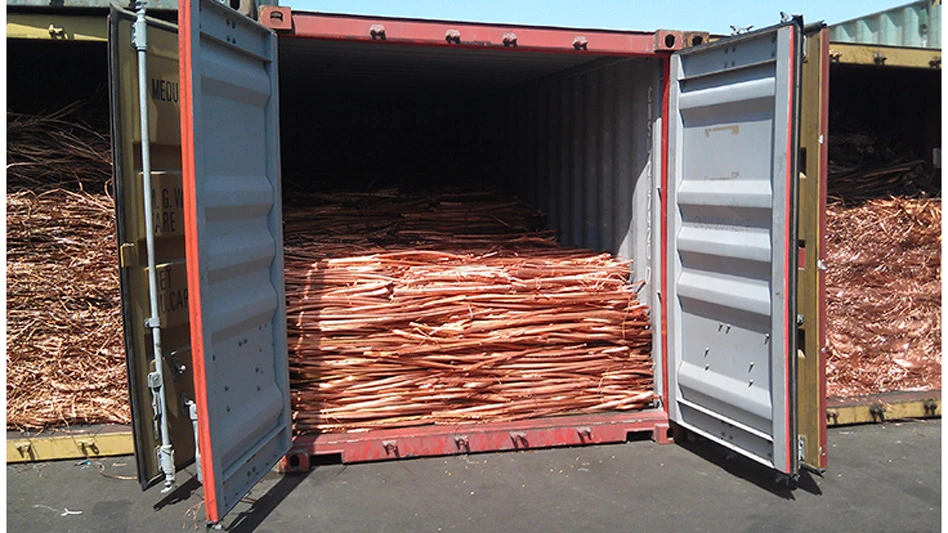While recyclers of all materials struggled through late 2008 and early 2009 in light of declining production and falling commodity prices, Recycling Today’s Paper, Plastics and Electronics Recycling Conferences offered attendees insight into dealing with current market conditions and a more optimistic forecast for the future. Several hundred paper, plastic and electronic recyclers from 13 countries kicked off the summer with a trip to Atlanta to attend the conferences June 7-9 at the Hyatt Regency downtown.
Those who attended were treated to presentations and expert panels from executives of recycling companies and industry associations. The conferences featured two keynote sessions. The first was a presentation by a chief economist outlining the causes and the effects of the current state of the economy, while the second assembled an expert panel of industry executives to discuss market conditions in the paper, plastic and electronics recycling industries.
EXPLAINING THE ECONOMIC CRISIS
In the first keynote presentation, Dr. Tom Cunningham of the Federal Reserve Bank of Atlanta explained the origins of the current economic recession and made predictions about the future state of the American economy. Cunningham prefaced his presentation by noting that the recycling industry is particularly sensitive to economic cycles because it is so dependent on manufacturing.
According to Cunningham, the origin of the current economic situation rests not surprisingly with the huge demand on the secondary market for subprime mortgages.
To meet the demand for subprime mortgages, banks began lending money to individuals who in normal market conditions would not be able to qualify for a loan. When credit quality deteriorated rapidly, the value of the subprime mortgages was compromised. Cunningham explained that the value of those subprime mortgages was not worthless, but impossible to calculate in real time. "If I want to sell my house, what’s my house worth?" Cunningham asked. "Well if I have to sell it in the next five minutes, not very much."
Because of the uncertainty about the long-term value of subprime mortgages, the demand for these securities plummeted. "We like to say that financial markets run on confidence," Cunningham said. "They don’t; they run on collateral." According to Cunningham, a major reason for the economic collapse was because those obtaining subprime mortgages had no collateral to justify the bank loans.
Cunningham also commented on the main reasons for the declining manufacturing industry and, consequently, the commodities markets. He said that in late 2008, consumers were spending more than they were making, a situation that could endure for a short time, but not long term. "Eventually it corrects itself, and when it does, in order to get consumption in line with income, you’re going to have to see a decline in production," Cunningham said.
Despite a negative GDP during the early part of the year, Cunningham said he did not expect the trend to continue. He predicted that the GDP would be about even in the third quarter and should return to positive for the final quarter of 2009. "We do think the recession is going to end at the second half of this year, but financing will remain difficult. People are going to be less likely to take risks," Cunningham said.
MARKET INTELLIGENCE
During the second keynote presentation, an expert panel was assembled to speak on the current conditions in the paper, plastic and electronics sectors of the recycling industry.
Reporting on the state of the electronics industry, Michael Profit, CEO of Intechra, Jackson, Miss., explained that the fragmentation of the electronics recycling industry has led to a number of players and business models that make standardization and certification difficult. "A foundation for growth of responsible recycling has been fostered by the industry, OEMs and government collaboration on best practices." Profit predicted further consolidation in the future because "stronger business models and sound practices will prevail."
Additionally, Profit said the electronics recycling industry was challenged by the variety of certification standards. He predicted that the G.R.A.D.E. standard developed by IDC to evaluate asset recovery and recycling service providers "will help separate the strong players from the weak."
While the relatively young electronics industry struggles with credibility issues, the established paper recycling industry is facing declining consumption and generation. In the second expert presentation, Jim Bowen, senior vice president of Sonoco Recycling, Hartsville, S.C., detailed the decline in domestic fiber consumption. According to Bowen, domestic consumption in the first quarter of 2009 was down 18 percent from the first quarter of 2008. Fortunately, Bowen said that export demand was faring better. "Generally exports of recovered paper remain strong," Bowen said, though they were off about 4.7 percent for the year at the time of the conference.
However, Bowen was optimistic for the future, noting that new production capacity would likely be based on recovered fiber. Pricing volatility would continue, he said, though there would be some periods of stability. "I expect prices to creep up with a lot of variability," he said.
While the paper recycling industry may continue to experience volatility, Kevin Cronin, CEO of Nicos Polymers Group, Nazareth, Pa., said the plastics market was slowly strengthening. According to Cronin, the markets were gradually rebounding from late 2008 but were still down 15 percent to 40 percent relative to early 2008. "A strong recovery is not likely before mid-2010," he said.
Issues affecting the plastics recycling industry include downturns in industrial production, bioplastics and bioadditives and collection strategies like single-stream, which greatly devalue recovered plastics, Cronin said.
MAKING NEW WAVES
In a session during the Paper Recycling Conference titled "Exports, Where Are We Now?," panelists from the paper recycling industry discussed the current international market for scrap paper.
During the presentation, scrap paper exporter Judy Lee of JC Horizon Ltd., Arcadia Calif., noted that in 2008 ONP (old newspapers) dropped from $250 per ton in the summer to $50 per ton in November, while OCC (old corrugated containers) fell from $150 to $50 during the same span. "There was just no demand… no orders," she said of the fall 2008 period. She added that some buyers did not honor orders. Lee indicated that the market was recovering and said "demand for paper [in China] is expected to boom. China will still be the world’s biggest manufacturer in the next 20 years."
The panel also discussed exports of scrap paper to India. Amit Patel of HnS International in the Netherlands, an exporter of fiber to India and China, remarked that his customers in India "kept buying all through the panic phase" of late 2008.
PIER SUPPORT
Another session at the conference focused on how export markets had changed since the downturn in the plastics recycling market in the fourth quarter of 2008.
Kathy Xuan, president and CEO of Parc. Corp., Romeoville, Ill., said "Since the market crash in the fall of ’08, the plastic recycling market has tilted toward Asia." She added that more than 300 million pounds of recycled plastics are exported to China, Hong Kong and Taiwan every month.
A final concern that worried Sunil Bagaria of GDB International, Edison Park, N.J., was the reneging on contracts similar to what was seen in the paper recycling industry. "Securing the timely payment of shipments now consumes considerable energies of the exporter from this country," he says.
KEEPING THE ELECTRONICS DOOR OPEN
During the Electronics Recycling Conference session "Responsible Exporting I: Revisiting the Problem", Robin Ingenthron of the World Reuse, Repair and Recycling Association (WR3A), Middlebury, Vt., asked concerned parties to come together for dialog and consensus when considering the issue of exporting electronics. Ingenthron called on fellow panelist Stephen D’Esposito of Resolv.org to bring together the WR3A with organizations calling for sweeping export bans of used electronics.
Ingenthron noted that proper exporting of refurbished electronics supports entrepreneurs in developing nations and makes connecting to the Internet affordable for people throughout the developing world.
Addressing those who want to ensure an end to the irresponsible shipment of mixed electronics loads to unsafe operators, Ed Brzytwa of the Office of the United States Trade Representative said, "A blunt instrument like an export ban is not the most sophisticated way to accomplish your objective."
The editorial staff of Recycling Today contributed to this article.

Explore the August 2009 Issue
Check out more from this issue and find your next story to read.
Latest from Recycling Today
- APR, RecyClass release partnership progress report
- Clearpoint Recycling, Enviroo sign PET supply contract
- Invista expanding ISCC Plus certification program
- Redwood partnership targets recycling of medium-format batteries
- Enfinite forms Hazardous & Specialty Waste Management Council
- Combined DRS, EPR legislation introduced in Rhode Island
- Eureka Recycling starts up newly upgraded MRF
- Reconomy Close the Gap campaign highlights need for circularity





